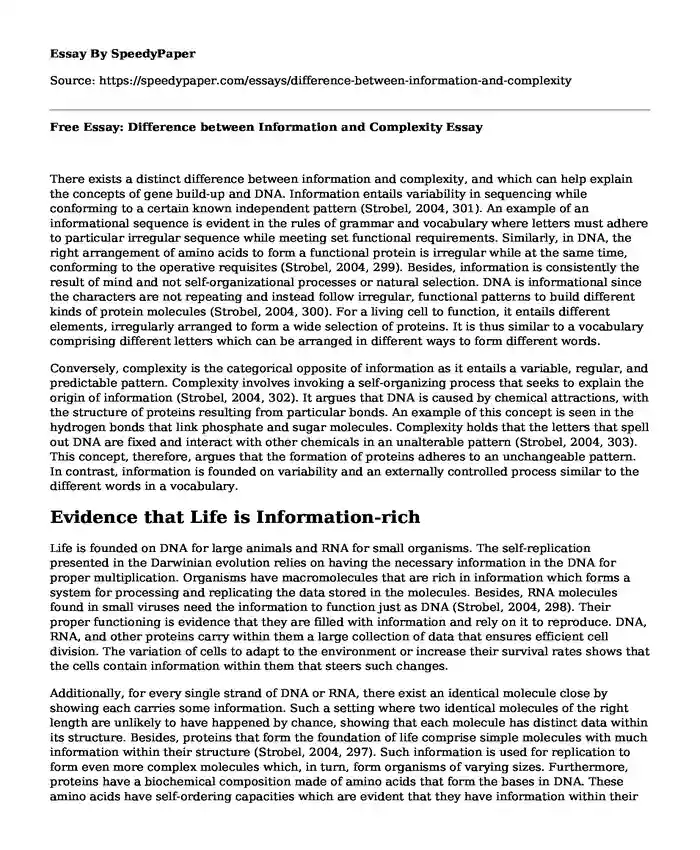
| Essay type: | Compare and contrast |
| Categories: | Biology Genetics Essays by wordcount |
| Pages: | 3 |
| Wordcount: | 579 words |
There exists a distinct difference between information and complexity, and which can help explain the concepts of gene build-up and DNA. Information entails variability in sequencing while conforming to a certain known independent pattern (Strobel, 2004, 301). An example of an informational sequence is evident in the rules of grammar and vocabulary where letters must adhere to particular irregular sequence while meeting set functional requirements. Similarly, in DNA, the right arrangement of amino acids to form a functional protein is irregular while at the same time, conforming to the operative requisites (Strobel, 2004, 299). Besides, information is consistently the result of mind and not self-organizational processes or natural selection. DNA is informational since the characters are not repeating and instead follow irregular, functional patterns to build different kinds of protein molecules (Strobel, 2004, 300). For a living cell to function, it entails different elements, irregularly arranged to form a wide selection of proteins. It is thus similar to a vocabulary comprising different letters which can be arranged in different ways to form different words.
Conversely, complexity is the categorical opposite of information as it entails a variable, regular, and predictable pattern. Complexity involves invoking a self-organizing process that seeks to explain the origin of information (Strobel, 2004, 302). It argues that DNA is caused by chemical attractions, with the structure of proteins resulting from particular bonds. An example of this concept is seen in the hydrogen bonds that link phosphate and sugar molecules. Complexity holds that the letters that spell out DNA are fixed and interact with other chemicals in an unalterable pattern (Strobel, 2004, 303). This concept, therefore, argues that the formation of proteins adheres to an unchangeable pattern. In contrast, information is founded on variability and an externally controlled process similar to the different words in a vocabulary.
Evidence that Life is Information-rich
Life is founded on DNA for large animals and RNA for small organisms. The self-replication presented in the Darwinian evolution relies on having the necessary information in the DNA for proper multiplication. Organisms have macromolecules that are rich in information which forms a system for processing and replicating the data stored in the molecules. Besides, RNA molecules found in small viruses need the information to function just as DNA (Strobel, 2004, 298). Their proper functioning is evidence that they are filled with information and rely on it to reproduce. DNA, RNA, and other proteins carry within them a large collection of data that ensures efficient cell division. The variation of cells to adapt to the environment or increase their survival rates shows that the cells contain information within them that steers such changes.
Additionally, for every single strand of DNA or RNA, there exist an identical molecule close by showing each carries some information. Such a setting where two identical molecules of the right length are unlikely to have happened by chance, showing that each molecule has distinct data within its structure. Besides, proteins that form the foundation of life comprise simple molecules with much information within their structure (Strobel, 2004, 297). Such information is used for replication to form even more complex molecules which, in turn, form organisms of varying sizes. Furthermore, proteins have a biochemical composition made of amino acids that form the bases in DNA. These amino acids have self-ordering capacities which are evident that they have information within their structures. Generally, life forms originate from proteins which are composed of information-rich; hence life is information-rich.
Reference
Strobel, L. (2004). The case for a Creator: A journalist investigates scientific evidence that points toward God. Zondervan.
Cite this page
Free Essay: Difference between Information and Complexity. (2023, Dec 11). Retrieved from https://speedypaper.com/essays/difference-between-information-and-complexity
Request Removal
If you are the original author of this essay and no longer wish to have it published on the SpeedyPaper website, please click below to request its removal:
- New Presidency Essay Example
- Free Essay about Informatics and Computing
- Explanation Essay Example of the Cartoon SJ Ray, Plague of Japanese Beetles, December 1942
- Essay Sample Discussing President Trump's Twitter
- Free Essay with Literary Analysis for "A Christmas Carol"
- HypothesisH0: r = 0 ("there is no relation when the population correlation coefficient is 0) H1: r > 0 ("there exists a positive relation between IQ and GPA when the population correlation >0) H1: r < 0 (there exists a negative relation between IQ and GPA when the population correlation coefficient is less than 0)
- Free Essay Example. Huawei Leadership Organisation
Popular categories




